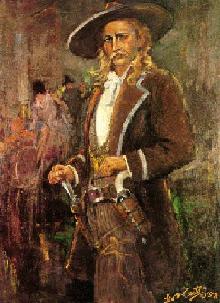| James Butler Hickok, or "Wild Bill" Hickok,
stum bled along behind a plow on his father's farm in La Salle County,
Illinois, until he grew big enough to have the gumption to drop the reins
and follow the birds. In 1851, after some pistol practice out behind the
barn, he became known as "Marshal Hickok" when he assumed the troubles for
Monticello Township. Wild Bill was a born lawman.
He proved his pistoleering genius when he shot down five desperadoes in a street brawl in Leavenworth, in 1858. No scallywags in Bill's bailiwick were going to go about shooting up the town. Bill was equally as handy with a knife, too, which he wore thrust into his pistol sash. He learned to know every foot of the Sante Fe Trail as he drove a stagecoach, but he had to give up this life after an encounter with a grizzly bear that mauled Bill something fearful. He was then ordered by the com pany down to Rock Creek Station in Nebraska where a man named David McCanles rankled Bill's nerves to the explosion point. He had to cut him down and rid the earth of him, along with his five cohorts who took to a shoot-out settlement. Bill didn't fool around. Independence , Missouri, a wild frontier settlement,
needed a lawman as fearless as Wild Bill. He took on the job and in a fortnight
or so cleaned out the blow hards, the gunslingers, drifters, and border The world looked big and wide to Bill, but it didn't daunt his spirit at all. He took everything in his stride, even a gunfighter named Dave Tutt, who had a terrible reputation for blood-letting. Although Wild Bill knew the blonde woman in question had something real per sonal to do with Tutt, he made advances just the same, because Bill liked women. This enraged Tutt, who demanded a showdown. He got it one Sunday morning when both men walked out into the wide street and people scattered. Both drew simultaneously, Bill shoot ing first, turning, walking nonchalantly away, while Tutt trembled as if in an ecstacy upon receiving the bullet, stumbled and fell on his face with not enough ebbing strength to pull the hair trigger. He was dead before he hit the ground. It makes the armchair spectator laugh to think of Wild Bill with his frills and gimmicks of dandy dress, his big pancake hat and groomed mustache and flowing hair. However, the Texas cowboy made no fun of it whatsoever when Bill became the law in Hays City, Kansas. "No guns in Hays City, sit," that was it. Take them off or get shot dead where you stood. Bill ruled with an iron hand. His reputation was enough to make a cowboy tremble, as he was always cutting down some body famous and running the Hickok peg up higher. His lightning draw became the conversation along many bars in the Old West. Bill was a proud figure of a man with broad shoulders, a mane of loose hair, and an eagle eye that searched the faces around him. Bear River Tom Smith carried his "I-carry-no-gun" philosophy too far and got stopped eternally with a bullet or two; and so, in 1871, when Abilene needed a man like Hickok to fill Smith's boots, the badge of office was readily accepted and Wild Bill moved up the board walks like a proud lion, peering into new faces, shoot ing searching glances along the bar rails of saloons, pausing, telling a cowboy to unbuckle his guns, etcetera. Bill always had a big radiant smile for the ladies, a courteous tip of his wide hat. Ben Thompson's associate, Phil Coe, was co-owner of the famed Bull's Head Saloon, and Wild Bill got a little peeved at a pornographic sign which hung over the establishment. He ordered it down. This eventually led Wild Bill to shoot it out with Phil Coe, killing him instantly, and to whirl about and shoot his own deputy, Mike Williams, by mistake. Many claim that Wild Bill was going blind, for it is a matter of record in the National Archives of Washington that he later visited Cheyenne where the post physician there noted his patient was going "blind from glaucoma". Bill joined Buffalo Bill Cody's Wild West Show in 1876. The make-believe life, however, was not for a man of his tastes. He finally moved on to the Black Hills of South Dakota where he was shot in the back of the head in Deadwood while playing cards in Carl Mann's saloon-shot by a drunken sot (whose name is unworthy of mention here), who was tried, convicted, and hung in 1877 in Custer City. |
 roughnecks, and then left to serve as a scout in the Federal Army in
Arkansas and Indian Territory.
roughnecks, and then left to serve as a scout in the Federal Army in
Arkansas and Indian Territory. 